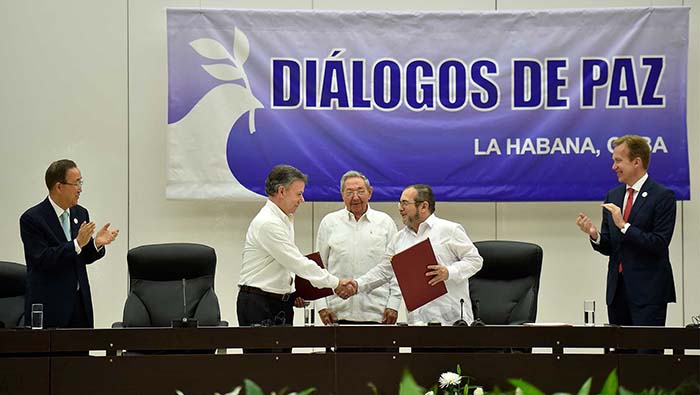View this article in another language
- 한국어
- English
- 日本語
- 中文
- العربية
- Español
- Français
- Deutsch
- Pусский
- Tiếng Việt
- Indonesian

Colombian president Juan Manuel Santos (second from left) and Rodrigo Londono Echeverri (second from right), shake hands during a presentation about the ceasefire agreement. (Presidency of the Republic of Colombia)
By Korea.net Honorary Reporter Kevelyn Ravelo Sarabia from Colombia
My name is Kevelyn Ravelo and I’m Colombian. Since I was born 26 years ago, I have lived in a country at war, having in the territory the oldest guerrilla force in Latin America, the Revolutionary Armed Forces of Colombia (FARC). This war has left many dead, forced displacements, kidnappings, rapes and poverty. Throughout my life, I have seen terrible news on TV every day, reaching the point of normalizing some of it. For me, it has become normal, but no less painful, the deaths in the news. Isn’t it normal to kill daily? Isn’t poverty normal? Isn’t inequality normal?
After growing, studying and learning, I realized that the answer is no. It isn't normal and we all have a great responsibility to change the reality of our countries and to give future generations a different reality. That is why today I want to talk to you about how peace isn't an empty word. Peace saves lives and gives hope to millions of people.
The date Nov. 24, 2016, was a day that I will never forget. The Colombian government, after almost four years of negotiation, signed a final agreement for the termination of the armed conflict with the FARC. What has changed since then? Peace is part of the vocabulary for Colombians, not as a word to be achieved, but as something that must be built day-by-day and among us all. We realized that ending a conflict doesn't generate peace, but it saves lives and it builds trust to build upon.
When the dialogue began, the conflict with the FARC left on average 300 deaths per year between citizens and combatants, while in 2017 they were reduced to 78, according to official figures from the Unit for Victims. In Colombia, there continues to be other guerrilla forces. There is also the strong problem of political corruption. However, every life saved through this agreement has been worthwhile.
There are many countries that have supported this process, including Korea, which since before the signing and through its president, in 2015 declared to be a great help for the post-conflict Colombia, providing support in sectors such as science, technology, security, the arts and innovation. In 2016, the Ambassador of the Republic of South Korea to Colombia Jang Myung-Soo met with Colombian Justice Minister Jorge Eduardo Londono and once again expressed his support for the peace process. He said, "After the war, my country was one of the poorest in the world, but this situation was overcome by renewing the mentality of citizens. The villages began a competitive process of productivity and poverty was forgotten. Now, we want to offer our good offices so that this same situation occurs in Colombia. You have a very difficult and time-consuming job ahead of you. I admire your efforts to overcome the war and that is why Korea wants to share its experiences with Colombia to support the post-conflict economy."
In the Korean War (1950-1953), Colombia was the only Latin American country that fought alongside Korea. Since then, both nations have been united over the years, relying on the difficult task of preserving the peace and welfare of its inhabitants. Colombia has expressed its support for the denuclearization of North Korea, while Korea has supported Colombia in the harsh post-conflict process.
As a Colombian, I know that there are many things that my country has to improve. I dream of the day when news programs no longer speak of internal violence. I dream that, like Korea, we can be an example of growth after suffering war. I hope that just as in Colombia and Korea there is a dialogue to build peace, countries around the world can come together to talk about world peace.
Love, support and peace from Colombia.
wisdom117@korea.kr
* This article is written by a Korea.net Honorary Reporter. Our group of Honorary Reporters are from all around the world, and they share with Korea.net their love and passion for all things Korean.